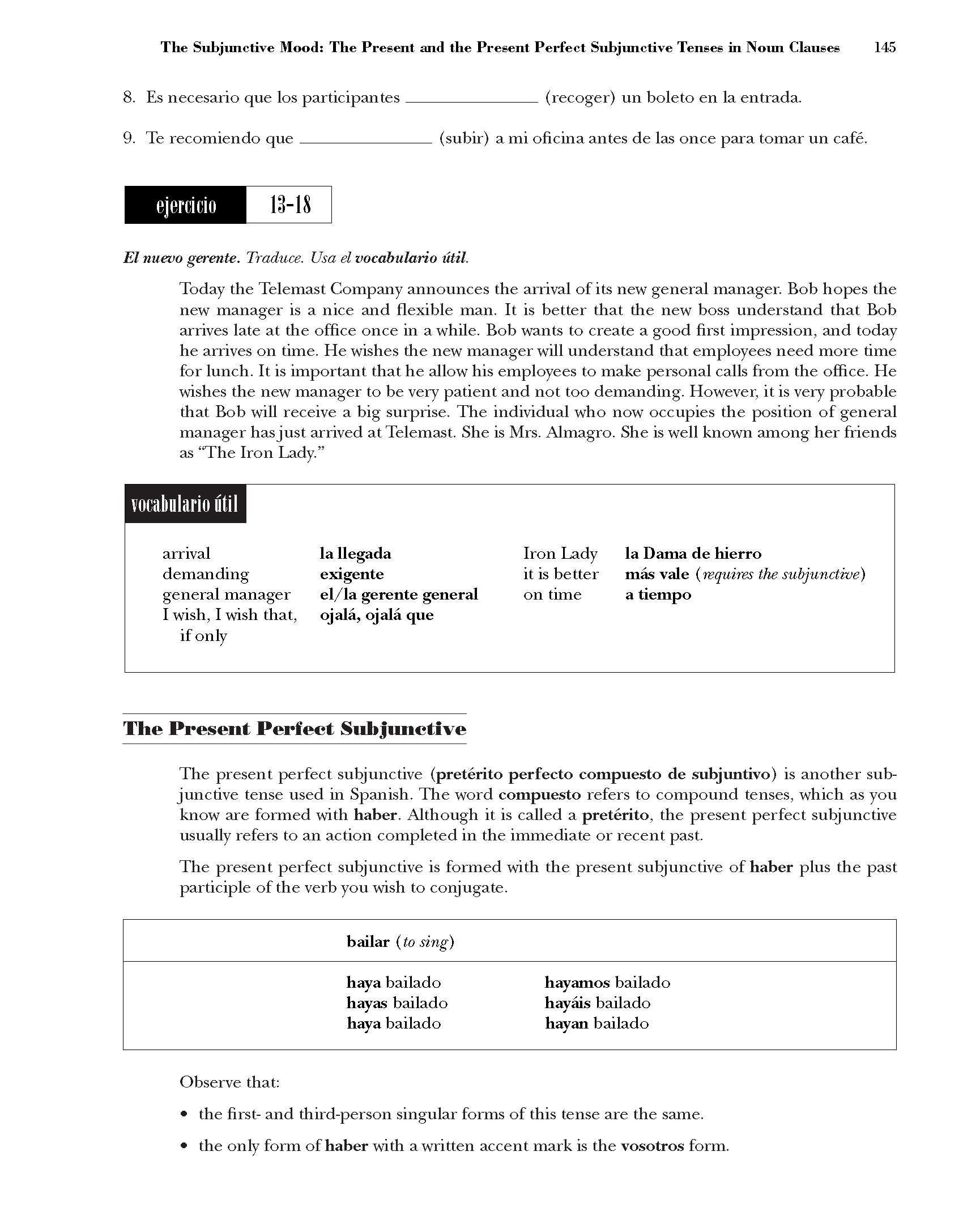CSG156

The Subjunctive Mood: The Present and the Present Perfect Subjunctive Tenses in Noun Clauses 145
8. Es necesario que los participantes_ (recoger) un boleto en la entrada.
9. Te recomiendo que_ (subir) a mi oficina antes de las once para tomar un cafe.
13-18
ejercicio
El nueuo gerente. Traduce. Usa el vocabulario util.
Today the Telemast Company announces the arrival of its new generał manager. Bob hopes the new manager is a nice and flexible man. It is better that the new boss understand that Bob arrives late at the office once in a while. Bob wants to create a good first impression, and today he arrives on time. He wishes the new manager will understand that employees need morę time for lunch. It is important that he allow his employees to make personal calls from the office. He wishes the new manager to be very patient and not too demanding. Howeyer, it is very probable that Bob will receive a big surprise. The individual who now occupies the position of generał manager hasjust arrived at Telemast. She is Mrs. Almagro. She is well known among her friends as “The Iron Lady.”
arrival demanding generał manager I wish, I wish that, if only
Iron Lady it is better on time
The Present Perfect Suhjunetive
The present perfect subjunctive (preterito perfecto compuesto de subjuntivo) is another sub-junctive tense used in Spanish. The word compuesto refers to compound tenses, which as you know are formed with haber. Although it is called a preterito, the present perfect subjunctive usually refers to an action completed in the immediate or recent past.
The present perfect subjunctive is formed with the present subjunctive of haber plus the past participle of the verb you wish to conjugate.
|
bailar (to sing) | |
|
haya bailado |
hayamos bailado |
|
hayas bailado |
hayais bailado |
|
haya bailado |
hayan bailado |
Observe that:
• the first- and third-person singular forms of this tense are the same.
• the only form of haber with a written accent mark is the yosotros form.
Wyszukiwarka
Podobne podstrony:
CSG142 Unit 13The 8ubjunotive Mood:The Present and the Present Perfect Subjunctive Tenses in No
CSG144 133 The Subjunctive Mood: The Present and the Present Perfect Subjunctive Tenses in Noun Clau
CSG146 The Subjunctive Mood: The Present and the Present Perfect Subjunctive Tenses in Noun Clauses
CSG148 137 The Subjimctive Mood: The Present and the Present Perfect Subjunctive Tenses in Noun Clau
CSG150 139 The Subjimctive Mood: The Present and the Present Perfect Subjunctive Tenses in Noun Clau
CSG152 141 The Subjunctive Mood: The Present and the Present Perfect Subjunctive Tenses in Noun Clau
CSG154 143 The Subjunctive Mood: The Present and the Present Perfect Subjunctive Tenses in Noun
CSG158 The Subjimctive Mood: The Present and the Present Perfect Subjunctive Tenses in Noun
więcej podobnych podstron